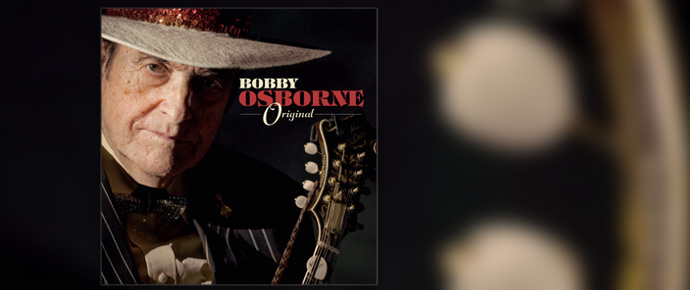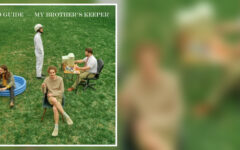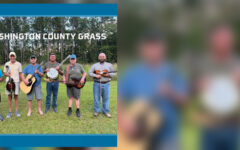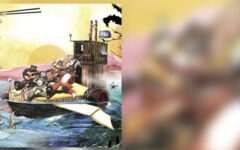
There aren’t many artists in their eighties releasing albums these days, even in bluegrass, where both fans and musicians often trend a little older than most music genres. There are even fewer artists in their eighties who get enough airplay from an album to make chart appearances, or enough support to maintain a regular touring schedule. However, Bobby Osborne is not just any artist. He’s a legitimate legend in bluegrass music who, at 85, has two songs in the Bluegrass Today Top 20, recently helped lead an all-star jam at Bonnaroo, and just released an excellent new album on Compass Records called Original.
With just ten tracks, Original is a compact album, but Osborne packs in as much music as he can, with help from a list of supporting artists that reads like a who’s who of acoustic music: Dale Ann Bradley, Alison Brown (who also produced the album), Michael Cleveland, Stuart Duncan, Vince Gill, Jim Hurst, Claire Lynch, Bryan McDowell, Dean Osborne, Todd Phillips, Missy Raines, Josh Williams, and more. Osborne sings lead on all of the songs, showing some maturity in his voice but clear as ever, and plays mandolin on several, twinning with artists like Sam Bush, Sierra Hull, and Ronnie McCoury.
Most listeners will have heard opening track They Call the Wind Maria, which has been hovering near the top of the charts for several months now. Originally from the 1951 musical Paint Your Wagon, set during the Gold Rush, it’s a yearning song that finds the singer pining for the woman he left behind. Brown sets the tone with rapid-fire, progressive banjo, while Duncan’s deft fiddling mimics the longing and loneliness in the lyrics. Osborne’s voice sails along, accompanied by harmonies from David Mayfield and Jim Lauderdale. I’ve Got to Get a Message to You comes from a source even more unusual to bluegrass – the Bee Gees. The original version was performed as more of a power ballad; Osborne approaches it with the bluegrass penchant for upbeat tragedies. Rob Ickes’ peppy dobro and bouncy banjo from Brown help the number make an easy transition to contemporary grass.
Mel Tillis’s Goodbye Wheeling matches Osborne with the McCourys – Del with a great harmony vocal, Ronnie on mandolin, and Rob with excellent Sonny Osborne-inspired banjo. While some of the other songs on the album find Osborne exploring other genres of music, with a slightly more progressive flair to the instrumentation, this is a throwback to classic Osborne Brothers. It’s a fun number about leaving town after being done wrong, with a bit of sass to both the vocals and music. Make the World Go Away, with its lush strings from Buddy Spicher and Matt Combs, makes the jump to classic country and allows Osborne to step into the role of country crooner. It’s one of the best vocal performances on the album and a thoroughly enjoyable listen.
Pathway of Teardrops is another track that pulls from traditional country, though here it’s firmly in the Osborne-style bluegrass camp. In fact, the Osborne Brothers recorded it in the 1960s. It’s a family affair here, as well, with Osborne’s sons Wynn (banjo), Bobby, Jr. (bass and harmony vocals), and Robby (drums) joining him. Wynn’s stately banjo is a highlight, matched with strong fiddles from David Crowe and Buddy Griffin. The same lineup (which also includes Joe Miller on guitar and harmony vocals) is in place on the bouncy Just in Case, a Forester Sisters song that finds the singer waiting patiently for a second chance from the one he loves.
The album’s best track is, hands down, Kentucky Morning from noted singer-songwriter Darrell Scott. It’s one of the best new songs I’ve heard that tackles the theme of Appalachian migration to the industrial Midwest. Told from the perspective of a man who tried his best to stay home while others were lured north by “the promise of a five dollar day,” it’s a testament to the power of the mountains to call folks home. While it wasn’t written specifically for Osborne, it’s an excellent fit for the southeastern Kentucky native whose family moved to Dayton, Ohio, while he was still young. The gentle melody and tasteful instrumentation fit the nostalgic lyrics well, and Osborne’s reading of the song is filled with a hint of wistfulness and plenty of love for home.
I hadn’t heard much of this album before reviewing it, and was a bit uncertain about what I might find, especially because the first couple of singles were from such diverse sources. However, I was happy to find plenty of classic, Osborne-style bluegrass mixed in with country, folk, and a few pop influences, all of it performed at the highest level.
Original is a must-listen for fans of Bobby Osborne and the Osborne Brothers, and should draw the legendary musician plenty of new acclaim, as well.
For more information on Bobby Osborne, visit his website at www.bobbyosborne.com. His new album is available from several online music retailers.







